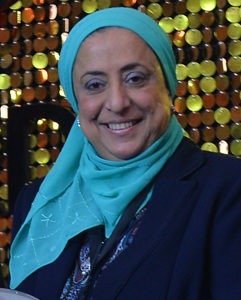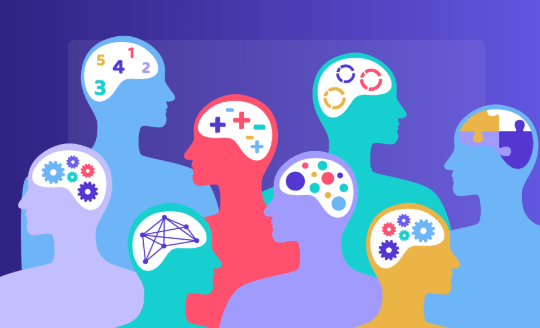Neurodiversity, encompassing conditions like autism, dyslexia, and ADHD, represents natural variations in human cognition, not deficits. Understanding this, alongside challenges faced by people with disabilities (PWDs), is crucial for fostering an inclusive job market in Egypt.
Maha Helali, a leading advocate for inclusive education and employment, has dedicated over two decades to this cause. Currently, she serves as the technical advisor to the Minister of Social Solidarity for Disability and Rehabilitation Affairs, driving policy that supports sustainable accessibility and inclusion, a vital role in shifting societal perspectives.
On Maha Helali’s Journey of Advocacy for Inclusivity


Maha Helali has dedicated over two decades to advocating for neurodivergent and disabled individuals in Egypt, championing their rights and expanding opportunities in education and employment.
Her extensive journey began with a master’s degree in Special and Inclusive Education from the University of London’s Institute of Education (IOE). In 1996, she founded the Learning Resource Center (LRC), providing crucial support to individuals with special needs.
In 1998, Helali co-founded the Egyptian ADVANCE Society for Persons with Autism & Related Disorders, taking on the role of chairperson.
From 2011 to 2018, Helali served as president of Inclusion International for the MENA region, advocating for policy changes and international cooperation that prioritize the needs of people with disabilities.
Her commitment was recognized in 2015 when she joined the board of the Egyptian National Council for Persons with Disabilities (NCPD), representing parents of individuals with intellectual disabilities and contributing to policy dialogue.
Her influence extends beyond Egypt through her work with organizations like UNESCO’s “Education For All” program and Inclusion International for the MENA region.
Helali’s work has been celebrated by numerous institutions, for example, in 2019 she was honored with the British Council’s “Social Impact Award” for her outstanding contributions to social change.
Challenges Faced by Neurodivergent and Disabled Employees
In Egypt, neurodivergent and differently abled employees encounter significant challenges. “One major issue is the lack of awareness about neurodiversity and disability, which often leads to miscommunication and misunderstandings,” says Helali. This lack of understanding creates unwelcoming workplaces.
- Inconsistent Application of Laws: While Egyptian Law #10 of 2018 provides protections, these are often inconsistently applied.
- Lack of Accommodations: Many workplaces lack sensory-friendly spaces and adaptive technologies.
- Stigma and Discrimination: Misconceptions result in exclusion and limited professional growth.
- Systemic Barriers: Restricted access to specialized education and vocational training hinders skill development.
Effective Accommodations and Workplace Culture
Helali emphasizes that inclusive environments require key accommodations:
- Flexible Work Schedules: Enhances productivity and well-being, especially for those who experience varying energy levels or sensory sensitivities.
- Quiet Workspaces: Supports focused work.
- Assistive Technologies: Tools such as speech-to-text software can empower employees to perform tasks more efficiently.
- Clear Communication: Utilizing straightforward communication strategies, including written instructions and visual aids, improves understanding and performance.
- Sensory-Friendly Environments: Modifying the workspace to minimize sensory overload, through soft lighting for example, minimizes sensory overload.
- Mentorship and Support Networks: Provides guidance and community.
Companies like Schneider, Procter & Gamble, and the Egyptian Food Bank are implementing these accommodations, according to Helali. However, many local businesses face financial and awareness barriers.
“A culture that values diversity, promotes open communication, and prioritizes empathy can create an environment where all employees feel valued and supported,” Helali said. In contrast, “a culture resistant to change or lacking awareness can perpetuate stigma and exclusion.”
Addressing Barriers and Empowering Individuals
Financial limitations and lack of awareness hinder inclusive practices in the workplace. Helali advocates for:
- Educational Initiatives and Awareness Campaigns: To change perceptions.
- Training Programs: To emphasize the benefits of diversity.
- Legal Incentives: Such as tax deductions for companies hiring persons with disabilities (PwDs).
- A Culture of Open Communication and Empathy: To foster inclusivity.
“Neurodivergent and disabled employees often bring unique skills such as exceptional attention to detail and innovative problem-solving abilities,” Helali notes.
For example, “individuals with autism may excel in tasks requiring precision and focus, while those with ADHD might contribute high energy and creativity to brainstorming sessions.”
Helali advises individuals to advocate for themselves and seek support while urging employers to foster a culture of zero tolerance for discrimination.
“For individuals with disabilities, it is essential to know your rights and seek support from allies and advocacy groups. Building a network of supportive colleagues and mentors can provide strength and encouragement,” she noted.
The Future of Inclusive Employment in Egypt
While comprehensive data is limited, global estimates indicate a significant population with disabilities. “The World Health Organization estimates that around 15% of the global population has some form of disability, which can be extrapolated to the MENA region.
Employment rates for disabled individuals are generally lower than those for the non-disabled population, reflecting systemic barriers and cultural challenges,” she said.
Helali acknowledges the gradual progress made over the past decade.
“Over the past five to 10 years, there has been a gradual increase in awareness and accommodation for differently abled individuals in Egypt and the broader MENA region. Companies like P&G, Schneider, and CIB have taken significant steps to implement inclusive practices, serving as examples for local businesses,” she said.
These developments are supported by advocacy efforts, government initiatives, and the growing recognition of the benefits of diversity.
Strengthening collaboration among the government, private sector, and civil society can lead to better policies and more effective advocacy. “Joint efforts can lead to more effective advocacy, improved access to resources, and a stronger commitment to disability inclusion across all sectors,” Helali concluded.
The commitment of progressive companies and advocates like Helali is essential for a future where all individuals have equal employment opportunities. As Egypt moves forward, it is a necessary building block for individuals, employers, and policymakers to foster a more inclusive environment.
WE ALSO SAID: Don’t Miss… Improving The Psychology Of Employees: How Office Designs Can Promote Mental Health



